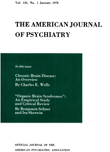Treatment of sex offenders with antiandrogenic medication: conceptualization, review of treatment modalities, and preliminary findings
Abstract
Sexual deviation disorders, or paraphilias, are diagnosable psychiatric syndromes manifested by 1) recurrent fantasies about deviant sex, 2) intense associated cravings, and 3) stereotypic behavioral responses. Pedophiles seek out children in response to their erotic thoughts and urges, whereas exhibitionists expose themselves. Paraphiliac syndromes ordinarily follow a chronic course and may be associated with biological pathology, but etiological factors are poorly understood. Treatment becomes a consideration when the well-being or rights of others are compromised. Proposed treatments have included psychotherapy, behavior therapy, surgery, and medication. Medroxyprogesterone acetate, which reduces testosterone, may diminish sexual preoccupation and urges, making self-control easier.
Access content
To read the fulltext, please use one of the options below to sign in or purchase access.- Personal login
- Institutional Login
- Sign in via OpenAthens
- Register for access
-
Please login/register if you wish to pair your device and check access availability.
Not a subscriber?
PsychiatryOnline subscription options offer access to the DSM-5 library, books, journals, CME, and patient resources. This all-in-one virtual library provides psychiatrists and mental health professionals with key resources for diagnosis, treatment, research, and professional development.
Need more help? PsychiatryOnline Customer Service may be reached by emailing [email protected] or by calling 800-368-5777 (in the U.S.) or 703-907-7322 (outside the U.S.).



